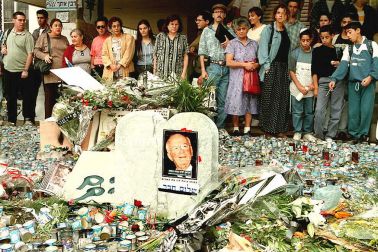It has been a while since I’ve considered the vexed question of Byrhtnoth’s ‘ofermod’. More than 30 years, in fact. I remember, as if it were yesterday, my Anglo-Saxon tutorials with dear, lovely, gentle Richard Hamer. And now he is the author of the standard translation being used by my children on their own university English Literature courses. (I suppose the Latin equivalent would be having been taught by the author of Kennedy’s ‘Eating’ Primer.)
Byrhtnoth’s ‘ofermod’ is the pivotal word in ‘The Battle of Maldon’, a 325-line fragment of Old English poetry about an otherwise obscure skirmish between the Anglo-Saxons and the Vikings, and much studied on English courses because it’s one of very few surviving examples of our island’s nascent literature. The Vikings won, but was it nonetheless a sort of moral victory for the Anglo-Saxons, who set a noble example through their heroic self-sacrifice? Or is the poem a veiled criticism of the arrogance and tactical stupidity of Byrhtnoth which helped bring about an unnecessary defeat?
Well, it depends on how you translate ‘ofermod’, which elsewhere in Anglo-Saxon literature is used to describe the overreaching pride of Satan. Not that I expect you to care very much either way, unless you read English yourself and it gives you a frisson of nostalgia. Which does rather invite the bigger question: why would anyone wish to spend three years of their lives and tens of thousands of pounds poring over such recondite linguistic nuances?
Lots of people now say that we shouldn’t: that ‘soft’ degrees like English Literature lead to dead-end jobs; that they’ve been irredeemably corrupted by teachers obsessed with feminism, Marxism, race, etc; that they lack the rigour of the Stem subjects everyone should be encouraged to do because then we’d be a world-beating tech economy.
I disagree with this. (Well, apart from the dead-end job bit, which I can vouch for.) If you’re mentally suited to an engineering or physics degree, good luck: I’m sure you’ll find a lucrative career waiting at the end of it. But some of us just don’t have that kind of brain. We find words come to us more easily than numbers; that we have a knack for reading and absorbing vast tracts of text, and then précis-ing them, mining them or constructing a compelling, well-supported argument for what’s really going on with them. These are skills that will always be useful and in demand.
Reading my old essays — kept safe all this time in a ring-bound folder — I’m struck by what invaluable training they gave me for real life. The skills they helped to hone include:
Pleasing difficult, capricious bosses — in this case, mainly my brilliant but demanding tutor, Mr Conrad — by anticipating their needs and then satisfying them. We all did this by rewriting the relevant sections of his Everyman History of English Literature and pretending his ideas were our own. The art, obviously, lay in our ingenuity in disguising the fact.
Bullshitting fluently. In one essay, I see I confidently cite La Chanson de Roland — a work I’m quite sure I’ve never read. (That said, I suspect that we were a lot more diligent than the current attention-deficient generation who skim, or read in translation, with outrageous profligacy. We all had to read ‘Maldon’, ‘The Dream of the Rood’, ‘The Seafarer’, etc in the original.)
Developing a style. Conrad’s comment after an essay on Shakespeare’s sonnets and ‘A Lover’s Complaint’ says: ‘Excellent; owes a lot to Kerrigan, obviously, but when you have improved on his style so admirably without damaging his content, why worry?’ I still can’t work out if this is a compliment or a crushingly bitchy put-down. Knowing Peter Conrad, probably a bit of both.
Cutting to the chase. Too many of us stay stuck in that GCSE or A-level mode of writing where verbiage is used as padding to boost your word count and conceal the poverty of your ideas. You need some cuttingly vicious teachers at university level to whip that nonsense out of you, otherwise you’re handicapped for life.
Getting to the bottom of things. I was really pleased when Boy said to me that writing an English essay is like solving a puzzle. If it’s not, you’re not doing it right — because the process should be fun and satisfyingly challenging rather than a chore. This is, I think, the most important thing of all you learn from doing a liberal arts degree: how to think critically.
On the most basic level, this leaves you better equipped to pass intelligent judgment on the latest books, TV shows, movies, albums and so on — both in the nuance of your vocabulary and the rigour of your approach. You might think: ‘So what? I’ve no plans to be a reviewer.’ Maybe, but critical thinking gives you the skill set to answer with fluency perhaps the world’s most commonly asked question: ‘Is it any good?’
This question — and its numerous variants such as ‘Should I bother?’, ‘Is it worth it?’ or, most recently, ‘Should I vote for these people?’ — is so important because it goes to the heart of pretty much everything that matters: discerning truth from falsehood; reality from fantasy; excellence from dross; facts from propaganda; and so on.
I can’t say my immaculate critical judgment has proved to be much use in my personal life (I have fallen victim to numerous con men). But in my professional life it has been invaluable. It’s like taking the red pill in The Matrix: you gain the ability to see the world as it really is, rather than as the corrupt, shadowy, self-serving elite would like you to see it. Which you won’t get if you read chemistry or biology — let alone PPE…






Comments